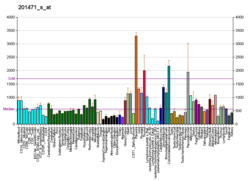Top Qs
Timeline
Chat
Perspective
Sequestosome 1
Protein-coding gene in humans From Wikipedia, the free encyclopedia
Remove ads
Sequestosome-1 is a protein that in humans is encoded by the SQSTM1 gene.[5][6][7] Also known as the ubiquitin-binding protein p62,[8] it is an autophagosome cargo protein that targets other proteins that bind to it for selective autophagy. By interacting with GATA4 and targeting it for degradation, it can inhibit GATA-4 associated senescence and senescence-associated secretory phenotype.[9]
Mutations in SQSTM1 are a common cause of Paget's disease of bone.[10]
Remove ads
Interactions
Sequestosome 1 has been shown to interact with:
Role in cancer
The SQSTM1 gene, which is actively transcribed as part of normal cellular function, is sometimes identified in fusion proteins, which can cause cancer when SQSTM1 is abnormally fused to a tyrosine kinase or other pro-proliferation gene. These genes are normally tightly regulated, but when bound to a minimally regulated gene like SQSTM1, they cause abnormal over-expression.[21]
References
Further reading
Wikiwand - on
Seamless Wikipedia browsing. On steroids.
Remove ads







